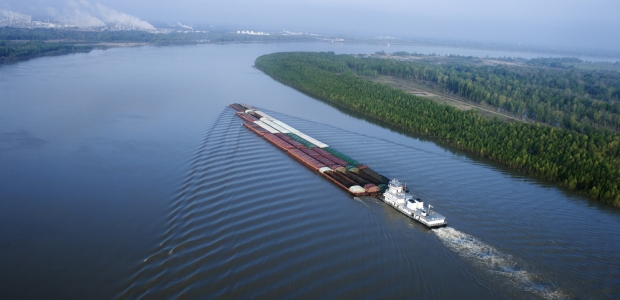
Barge Shipments of Fracking Waste Water Opposed
Dozens of comments urge the U.S. Coast Guard not to allow barge owners to ship shale gas extraction waste water via inland waterways, saying it is a threat to drinking water supplies.
Dozens of comments have been submitted urging the U.S. Coast Guard not to go forward with a proposed policy letter that would allow barge owners to receive a Certificate of Inspection endorsement and transport shale gas extraction waste water by barge from northern Appalachia via inland waterways to storage or reprocessing centers and final disposal sites in Ohio, Texas, and Louisiana. The Coast Guard proposed the letter Oct. 30 and asked for comments by Nov. 29; more than 200 were submitted, almost all of them asking that barge shipments not be allowed.
"I am 100% against having waste water from fracking traveling down our rivers, the arteries of our country," one commenter wrote. "This practice puts the drinking water of this region at great risk. My understanding from scientists is that a barge accident with this waste would be worse than a massive oil spill, since oil floats and can be cleaned up with booms, whereas this waste would sink to the bottom of the river and kill everything there. This polluted water is a tragedy to begin with, as fracking results in contamination of groundwater and depletion of our fossil aquifers--which cannot be restored in a human timescale--and converts precious freshwater to polluted waste. All of this is to merely extend the fossil fuels economy for a ‘last gasp’--instead of getting on with the business of building a renewable energy based economy, which is what we should and must be doing for our long term survival. The chemicals and radiation that is in this waste water really belongs in the backyards of those few who are making large sums of money in the fracking industry, at the expense of the rest of us."
The Coast Guard's proposed letter, titled "Carriage of Conditionally Permitted Shale Gas Extraction Waste Water in Bulk," noted that shale gas extraction waste water is either stored at drilling sites or transported by rail or truck to storage or reprocessing centers. "There is commercial interest in transporting SGEWW from northern Appalachia via inland waterways to storage or reprocessing centers and final disposal sites in Ohio, Texas, and Louisiana," it states.
46 CFR 153.900(a) and (c) allows bulk liquid hazardous material to be transported by a tank vessel if it is a "listed cargo," but shale gas extraction waste water cannot be treated as a "listed cargo," according to USCG, because the specific chemical composition of the waste water varies from one consignment load to another and it may contain one or more hazardous materials as defined in 46 CFR 153.2, including radioactive isotopes such as radium-226 and radium-228. Variables affecting the chemical composition of SGEWW include the chemicals present in the initial drilling fluid, the specific site being drilled, and the age of the well. Transported waste water loads also can be a mixture of waste water from different wells.